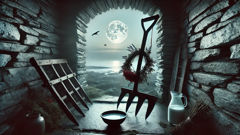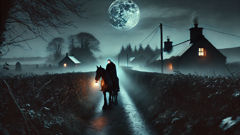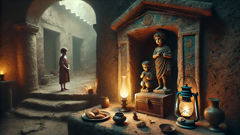Introduction
The west in Connacht carries more than a breeze; it holds a rumor of the beyond. Old men in peat-smoke kitchens will nod and lower their voices when the sky over the Atlantic darkens, as if the wind itself were an emissary of some uncanny court. They call them the Sluagh — a terrible word that slips like ice into the throat: the unforgiven dead, a flock of restless souls said to fly, a host of thieves that arrives in the last breath of a life. They do not come for grudges alone, nor for the peaceful dead; they come for those whose reckonings were left unfinished, for debts unpaid in blood or kindness, for those who died bitter and unbaptized by the mercy of community. In the too-bright hush before dawn, when the sea's steady sigh meets a falcon's lonely cry, villagers place iron at doorways, murmuring prayers and turning the pillows of the dying. A single wrong turn, a lapse of watchfulness, and a soul—a bright small ember of memory—may be seized and swept out over water, carried westwards where no living eye can follow. This tale unfolds in a cove of stone and moss, where gulls wheel like thrown coins and where the horizon is a dark lip. It is a tale of a mother who knew the old signs, of a son who would not yield his father's last breath, and of the terrible, secret flight of the Sluagh under storm-cloud and moon.
The Night They Came: A Village on the Edge
In the little cove of Carraig Bheag, houses crouched against the Atlantic as if listening. Their low doors and peat-stained rafters kept out both weather and rumor, though neither could ever be kept entirely away. The village had been built around a spring, and its people measured years by harvests, births, and the long, patient cycles of nettle and seaweed. But the sea brought other things than fish: ships from distant ports, driftwood with foreign nails, and stories — and among those stories, the soft, sharp tale of the Sluagh. People spoke of them in fits and starts, as if naming them aloud might give them purchase. Old Áine, who kept the hearth for three generations, would stir her porridge and say, "When the west wind carries a silence, that's when they fly." Her hands were knotted and stained, her fingernails black with peat, but her eyes were quick. She had seen things that younger folk had never seen, small mercies and cruelties both; she had seen a brown cow refuse to cross a threshold and had watched a newborn shout at nothing in the corner. She knew the old ways of warding and the older ways of naming.

On an October night when the wind had teeth, a fever moved through Carraig Bheag. It took men who worked nets and women who bent over looms with the same indifferent hand; it took a schoolboy in a blue cap and then, with a more deliberate cruelty, it took Liam Ó Dónaill's father, a gaunt man who had been a fisherman until his back was too broken to pull lines. He lay in a small bed against the whitewashed wall, his breaths coming like a bellows with a hole. People said in the morning that the sea was restless — a black bruise on the horizon — and that gulls refused to cry as if they too were afraid. Liam, who had always tended his parent's small garden and swept the kitchen floor, kept a candle near his father's pillow. He had heard of the Sluagh from his grandmother, who had told him to keep a string of rowan by the bedside and to leave the hearth smoke undimmed through the night. But Liam was young in the ways of dread; he had not learned the precise litany of gestures that mattered — which side to turn the dying body, which foot to bind with black thread, which stories to tell until dawn.
It is a curious thing, how the presence of death rearranges a room. Chairs become islands. Voices become careful instruments. The house, which had held laughter and tobacco and the dull clatter of spoons for decades, changed its pitch and its smell: salt, iron, the faint sweetness of peat. Neighbors came and bent with the gravity of tenderness, but there was a hollowness to it too, a sensing that something unseen might be listening. The people who had lived within a stone's throw of each other all their lives kept watch in shifts, watching the chest rise and fall, shouting the hours as if naming the passing time might anchor the life still flickering within. A storm pressed toward the coast, black as if painted with old ink, and the west wind gathered itself like a beast preparing to leap. From the hearth came the old woman's murmured prayers. At the window, sea-spray hissed and the sky moved with a generosity of stars that seemed, at once, indifferent and abundant.
As Liam held his father's hand, his mother went about the old tasks with a steady, skeletal efficiency. She fetched cut water, salted the fish they would not now eat, and set iron knives and eel hooks at every threshold. There are rites that practical people keep because they are useful: iron is heavy and unwieldy, but its presence in doorways gave people something to do with their fear. More than gestures, though, there are words. Songs, kept in the throat like small weapons, have a power beyond belief in places where the air is thin with rain and legend. Áine whispered an old verse — it began with a name and ended in nothing, the cadence of a charm rather than a petition — and then she began to sing the tale of a man who once bartered with a stranger and paid with his child's shadow. Liam listened because he had to, because the world of the living and the dead had always been braided here: prayers at the wakes, curses in the taverns, the nicked stones that marked where a soul was thought to have slipped away. He felt that the night held itself like a muscle ready to snap.
Just before midnight, when the candles had bled low into their holders, the first sound came: a rushing like wings over water. It was not the cry of a bird but the movement of a hundred small things, a susurrus that made the hair on Liam's arms stand up. The window glass rattled in its lead, and in that rattling a pattern seemed to form: a rhythm both ancient and merciless. Áine rose slowly and placed her back against the wall, palms flat to stone, like a woman bracing against an old wind. She uttered a single name — one the family had never spoken aloud — and the sound struck the room like a bell. There was a pause, a tightening of the air; then the sound of wings again, nearer this time, as if the Sluagh had alighted on the thatch and were peering at the life within.
When the invisible host passed, it felt like a cold hand glancing across a cheek. The candle flames bent and then returned. Liam's father's breath grew shallow, and in the gap between exhale and inhale Liam saw something in the corner of his eye: a slip of gray light, thin and sharp, that threaded through the seam between the blankets and the bed. It was a small thing to see, but he saw it. Instinct made him grip his father's wrist, but his fingers found only the quick beat of a pulse that seemed to be arguing with sleep. In the presence of such thinness, the simplest acts are weighty: he pressed his palms against the man's chest and began, in a voice that broke like a rope, to tell him of small, ordinary things — the names of the neighbors, the time the cat slept in the harbor, the smell of new-mown hay — as if a list of tiny facts could be a tether to the living world.
Outside, the wind shifted and the sea's murmurs rolled like distant glass. The host had moved on, carrying with it the echo of stolen breath. In that stolen moment, Liam discovered that courage is a strange and desperate thing. It is not always a hero's cry; sometimes it is the stubbornness that keeps a fragile hand warm. He thought of his child's life, of the harvests and the small triumphs, and he refused to let it go without fight. He lit a strip of turf so that smoke would rise thick into the rafters, and he tied a rowan sprig to the bedpost, humming the oldest of songs that Áine had taught him. Whether by rite or by accident, the watch at the window saw a silhouette leave the cottage and drift seaward, a smear of absence that the gulls did not follow. In the morning they would speak of the fever's toll and of those spared. But that night the house held its breath and bore witness to a truth older than law: the world is bound by fragile agreements, and the Sluagh move to claim when those agreements are loosened.
Measures and Memory: The Rites That Bind
Stories live in repetition. They are learned by watching and by failing, and in coastal places that speak to both sea and sky, people learn to read both weather and omen. The Sluagh, as they were called, were never a single thing; different townlands had different names for them, and different favors to ask in the night. In some accounts they were a tribe of fallen warriors; in others, they were the souls of those who had violated sacred law. What the stories agreed on was their westward arrival — a winged stream borne on the breath of the ocean — and their appetite for the last, delicate thread that ties memory to flesh. That thread is a small shine, like a mote, that appears at the closing of the eyes. It is not measurable by instruments; it is known by the smell of the room and the way a dog will refuse to sleep. To the people of Carraig Bheag, such images were everyday knowledge, passed like bread from hand to hand.

Áine, who had been widowed twice and outlived two of her brothers, had learned her protective measures from a woman who had once been called a cunning-woman, a well of knowledge and taboos no longer fashionable in the larger towns but preserved like moss in remote parishes. The cunning-woman had taught Áine how to place a blackthorn beneath the pillow, to keep the bed's foot pointed eastward, and to rub a rune of salt into the threshold when the west wind was strong. These are precise acts. Their logic springs from a world that believes the geography of the body matters: the soul will prefer the widest exit, the easiest seam, and the customs are meant to force its path toward the hearth and the altar. There was also the matter of gifts: bowls of milk left at crossways, a smear of butter on a lintel, small obligations to spirits that once might have been generous and are now greedy. It is tempting to read these as superstition, but superstition is often the communal memory of pragmatic measures that kept a people alive in hard places.
Liam's mother had once been scornful of rites she could not taste, but the fever changed her. She moved now with the quiet authority of someone who had seen how a life might be undone by inattentive hands. She insisted that the bed be turned so the dying man's head was toward the east, she burned turf until the smoke blackened the rafters, and she placed iron — an old ploughshare that had once rolled in the mud — across the doorway. The neighbor women, when they came with towels and stews and a soft, precise silence, crossed themselves and murmured an odd mixture of prayers and folk-phrases, remnants of both church and older law. One of them, Mairead, fetched a length of yellow wool and wound it seven times about the dying man's wrist, a knot for every year of mercy she hoped might be granted. They spoke in the soft syllables that adults use to shape children: names, memories, small humiliations, recounted with laughter to hold the living world near. It was a work of attention.
Yet even the most meticulous ritual cannot wholly master chance. The Sluagh are described like wind because they are everywhere and nowhere: a cry in the rafters, a movement across the water, a hush like a hand closing. The tales say they will not take those whose debts are paid, but who can say what counts for debt? In a place where kinship is currency, a slight can be a debt of the oldest kind; the mortified pride of a crone may be a ledger more binding than coin. In the winter of Liam's childhood, a man named Seamus had refused to give shelter to a stranger who later turned out to be a repentant soul. Seamus died alone in a shed and the villagers said the Sluagh took him because his refusal had been unkind. Whether that was true is less important than the way it shaped conduct: people learned to be generous at crossroads because the story made them so. In small communities, legend is governance.
There were also counter-stories: the Sluagh, some said, were not punished for sin so much as for being forgotten. A life that pulled away from the social ledger — a woman who left for the city, a child drowned without a name carved on a stone — might become hungry, resentful, and join the host. If the Sluagh were the unforgiven, perhaps forgiveness was the remedy. Some families kept wake-lights burning for a week after burial, a small practice that honored the dead and, perhaps, deterred the host. Others would hold a music and a feast, inviting neighbors and asking for stories of the departed so memory might stitch them back into the living tapestry. The moral logic of these rites is simple — do not let belonging be broken by neglect — and it produced a remarkable kind of social cohesion.
Not all remedies were gentle. Where fear was sharp, people took measures that were harsh. There are stories of waking a body believed to be stolen, of cutting the hair of the deceased to keep the soul home, of burning a few hairs on the hearth and letting the smoke find the seams between floorboards where a soul might slip. There are tales of those who attempted to bargain with the Sluagh, offering blood or coin for a single night more. Such bargains are always depicted as catastrophic: the host does not keep agreements the way the living do. This is the moral strand in many versions of the tale — a warning that bargaining with forces outside the living law is a perilous exercise, for the rules they follow are older, stranger, and often cold.
In Carraig Bheag, the community's response to the fever and to the threat of the Sluagh was a mixture of tenderness and cunning. They kept to their rites because the rites had outlived their origin myths and become the scaffolding of daily life. Liam learned then that knowledge matters as much as courage. The old woman wound wool and placed iron, and Liam, who had once thought himself too young to matter, found a new competence in the smallest tasks: folding a blanket the right way, humming a protective rhyme, and, most crucially, keeping watch at the bedside while a lantern sputtered. At dawn, when gulls at last raised their voices and the sea lay like a sheet of dull metal under a whitening sky, there was talk of what had passed. For some, the night had taken little; for others, the tally would be heavier. But the measure of the village's strength was not in the count of those lost but in the way neighbors rebuilt the broken ledger of memory, name by name, until the host could not claim them for want of a remembered thing.
Conclusion
Over years and generations, the telling of the Sluagh did what stories do best: it kept a people mindful. The tale hardened into counsel and softened into ritual, and by being told it shaped how the living honored the dying. Liam went on to be an elder, and every autumn his children would hear him hum the same protective verse, his voice gathering the past in its throat like smoke. The Sluagh never became a simple devil to blame; they were a mirror held up to communal neglect and to the small moral balances that make remote life possible. The lesson the old songs taught is not just about fear, but responsibility: that every neighbor is responsible for the threads that bind us, that to be unforgiven is to risk joining a host of restless memory, and that the most ordinary acts — leaving a light burning, saying a name aloud, tying a strand of wool around a wrist — are sometimes the most heroic. When the west wind comes now, people of Carraig Bheag still take note. They place iron where iron is due, keep watch at bedsides, and tell the stories to anyone who will listen. Whether the Sluagh are only a tradition that stitched a hard community together or something older, the measures remain useful. They remind us that death is not merely a private affair but a knot in the fabric of many lives, and that memory is the currency that may keep a soul at home. The host flies where memory thins; the remedy is simple and human: keep taking care of one another.













